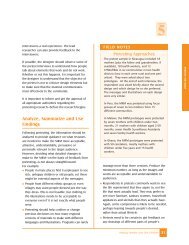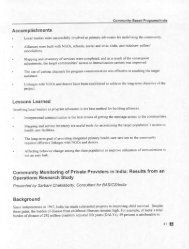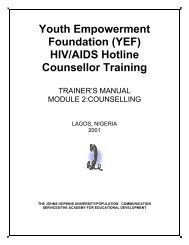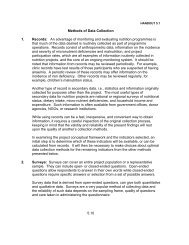MODULE TWO: COUNSELLING - FHI 360 Center for Global Health ...
MODULE TWO: COUNSELLING - FHI 360 Center for Global Health ...
MODULE TWO: COUNSELLING - FHI 360 Center for Global Health ...
Create successful ePaper yourself
Turn your PDF publications into a flip-book with our unique Google optimized e-Paper software.
•A caller is talking non-stop. She has taken 20 minutes to tell you her story, and<br />
you are not able to ask any questions or have any kind of dialogue. She is<br />
beginning to repeat things, and doesn’t show any sign of stopping soon.<br />
•After you tell him that HIV has no cure, a caller becomes upset and threatens to<br />
come harm you.<br />
•A man calls back many times during one week and he always demands to speak<br />
to the same counsellor.<br />
•A caller wants you to notify the police about his neighbour, who is a prostitute.<br />
The caller says that the prostitute is spreading AIDS, and that she belongs in<br />
prison.<br />
Suggestions <strong>for</strong> Handling Problem Calls<br />
Following are some suggestions <strong>for</strong> dealing with problem callers:<br />
♦PROBLEM: The caller asks the counsellor <strong>for</strong> personal in<strong>for</strong>mation.<br />
Callers may be curious about a counsellor’s background, or they may want to<br />
find out personal in<strong>for</strong>mation so that they can see the counsellor in person.<br />
Sometimes callers want to assess the counsellor’s experience with similar<br />
problems in order to judge whether or not the counsellor can “relate” to their<br />
situation and feelings. For example, if a caller has just tested HIV-positive, s/he<br />
may want to know whether or not the counsellor is also HIV-positive.<br />
COUNSELLORS SHOULD NOT GIVE OUT ANY PERSONAL INFORMATION<br />
ABOUT THEMSELVES. This is especially true <strong>for</strong> names. It is fine <strong>for</strong> a<br />
counsellor to use his/her first name, but s/he should never give out his/her full<br />
name. Counsellors should never arrange to have face-to-face meetings with a<br />
caller. If a caller asks <strong>for</strong> other personal in<strong>for</strong>mation, it is important <strong>for</strong> the<br />
counsellor to try and focus the conversation back on the caller (Ex: I understand<br />
why you might be curious about my HIV status, but that knowledge really won’t<br />
help your own situation. Let’s talk about how you are feeling right now…”).<br />
♦PROBLEM: A caller is uncom<strong>for</strong>table with the counsellor because of<br />
his/her gender, ethnicity or other un-changeable characteristic. In<br />
this situation, the counsellor could acknowledge the caller’s discom<strong>for</strong>t and say<br />
that even though they are of a different gender/ethnic group, the counsellor is<br />
still able to listen to what the caller has to say and try and help him/her in an<br />
objective way. If the caller is still uncom<strong>for</strong>table, the counsellor could offer to<br />
transfer him/her to another counsellor (if there is another one available). If<br />
there is not another counsellor available, the counsellor could offer the caller the<br />
option of calling back at another time when the appropriate type of counsellor<br />
Session 7- Pg. 2
















